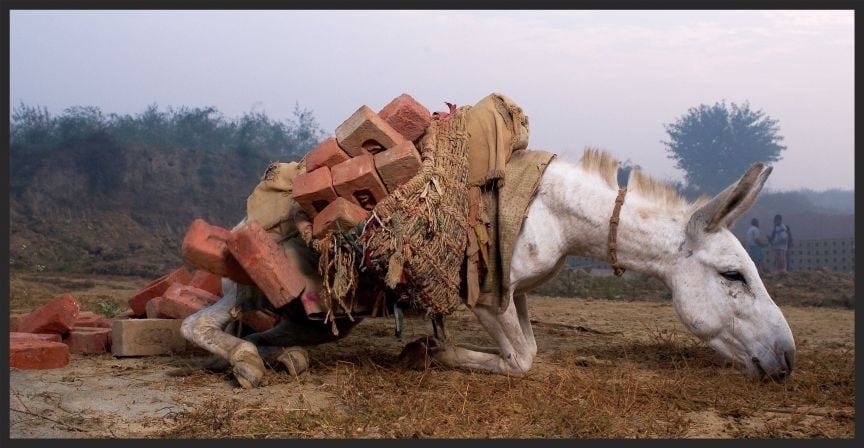When Helping is Harming
The Limits of Assisting an Ass
A while ago I was at baggage collection in the airport, trying to figure out how to transport four suitcases/ duffels all by myself. A neighbor of mine who happened to be there showed me an ingenious way of loading them all onto a single cart. I thanked him profusely and we went our separate ways. A few minutes later, of course, the entire thing toppled over.
This popped back into my mind when thinking about a situation that appeared in yesterday’s Torah reading. If you come across an enemy of yours who is having difficulty with the burden on his donkey, then it’s a mitzvah to help him. But there’s an interesting twist. The Mishnah says that it only applies if the donkey’s owner also cooperates. But if the owner sits back and tells you that it’s your mitzvah and you should do it by yourself, then there’s no mitzvah at all.
Rabbi Jonathan Sacks has some very powerful words to say about this:
A fundamental principle of biblical morality is involved here: reciprocity. We owe duties to those who recognize the concept of duty. We have a responsibility to those who acknowledge responsibility. If, however, the person concerned refuses to exercise his duty to his own overloaded animal, then we do not make things better by coming to his aid. On the contrary, we make it worse, by allowing him to escape responsibility. We become – in the language of addiction-therapy – co-dependents. We reinforce the very problem we are trying to help solve. We allow the individual to believe that there will always be someone else to do what is morally necessary. We create what the psychologist Martin Seligman calls ‘learned helplessness’. We may feel that we are being super-righteous; and we may be right. But we are thereby making ourselves better at the cost of making society worse.
There’s an obvious lesson here for contemporary Jewish society. There is a bizarre modern frum phenomenon of people who refuse to engage in effort to support themselves (or protect themselves). It may feel righteous to help them anyway, but you’re encouraging them to escape responsibility. You’ve reinforced the very problem you are trying to help solve, and while making yourself better, it comes at the cost of making society worse.
Giving handouts to yeshivos and kollel families, who are under the misguided impression that this is the situation Hashem wants, perpetuates the problem of poverty and (in Israel) its effect on the economy. In fact, it even increases it, because the recipients then raise a next generation to believe that this is the correct path. That’s why I’m a supporter of Lemaan Achai - a local charity organization whose motto is “Smart Chesed.” They don’t give handouts of money to people who refuse to help themselves; instead, they have a team of professionals who figure out how to help families gain financial independence. Tzedakah is not about feeling good or personal growth - it’s about helping society in a smart way.
* * *
Meanwhile, this Shabbos I’ll be speaking at Bais Tefilah in Woodmere, and after that I’ll be making my way to Teaneck, Miami, Hollywood and Boca. I’d be glad to meet with museum patrons - please email Ellen at advancement@BiblicalNaturalHistory.org to arrange it.





Slifkin scatters his luggage in the airport and charedim come to his mind. Hears about the mtzva of טעינה and anti-charedi thoughts come to him. And he thinks that this silly drivel has to be regurgitated forever to save the world from the parasitic charedim. He's been engaged in this enerprise for the last 15 years and what are the results? Charedim are more numerous, recieve increasing financial support and have not lost their political power.
Why doesn't Slifkin deal with the 75% dropout rate of the DL in the army, except to blame charedim for it? Because that society's education path is doomed and leads the majority off the derech and nothing can be done about it. But charedim, who avoid this disaster, become the target of his wrath.
I'm just reading the bickering in the comments sectiom and I'm reminded of this quote from Upton Sinclair:
"It is difficult to get a man to understand something, when his salary depends on his not understanding it"
Charedim (and those who have bought into a Charedi ethos) can hardly admit that their socio-economic model is the biggest internal threat to the first (and amazingly successful!) experiment in Jewish self-determination in two millenia. The comments on your posts on this topic are a perfect example of this, with endless deflection from Charedi commenters, all aimed at avoiding admitting the obvious truths you point out.
Beyond the fact that this is something immensely difficult to admit, there's also the difficulty of appreciating what it means to be at an inflection point on an exponential curve. There were 1.35 million Charedim in Israel in 2023 - the Israeli statisical authority forecasts that there will be 5.83 million Charedim in 2062 vs 9.48 million non-Charedi Jews. That's only 38 years' time! Something major will have to give eventually, whether people realise it now or not.
While it's true that dealing with this issue now would save a much more challenging reckoning in a few decades, I struggle to see the necessary political will from non-Charedi Israelis materialising, given that they would be forced to stand firm on defunding Charedi institutions (and not allowing Charedi parties into governing coalitions) for a couple of decades, when immediate political considerations will always make it easier to just give in.
I'm ultimately optimistic, because Charedim are also חפצי חיים, and I don't see any other country accepting 5-10 million Charedim, and my guess is that the eventual crisis will lead to a dramatic shift, just as the crisis in Eastern Europe did a century ago, but unfortunately my guess is that the crisis will actually have to occur first.
I feel like a crazy person writing this, when the current situation is still manageable (albeit challenging and intolerable morally), but the demographics are hard to escape.